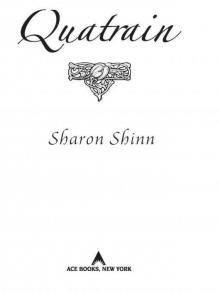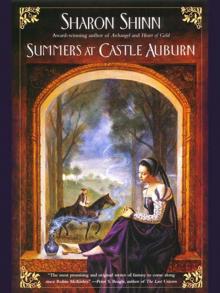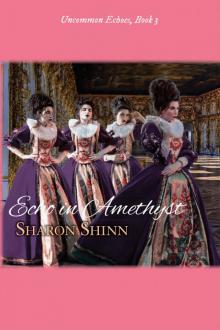- Home
- Sharon Shinn
Archangel Page 9
Archangel Read online
Page 9
Unwillingly, Rachel followed her back into the labyrinth. Surely there was more to that story than she had been told—at a guess, Jeremiah’s fickle attention had wandered again, and no doubt that was a tale Hannah would never relate to her. Still, Rachel had acquired some useful information, some of which she could turn to good account. Angels loved where they would and no one minded. She had not loved anyone for a long time. If she was not required to love the man she was required to marry, it might not be so bad after all.
Another thing had been made clear to her during this tour of the Eyrie. She was expected to sing—at Gabriel’s side at the Gloria and any time she might be moved to beforehand. She felt the old defiant stubbornness rising, pouring through her bones like so much wax into a mold. And if she didn’t care to sing—?
Before their interesting detour to the meeting plateau, they had come to a hallway buried deep in the lower level of the Eyrie. The top level, Hannah had explained, comprised the living quarters. The middle level was made up of kitchens, dining areas and common rooms. The bottom level was given over to storage, schoolrooms and music. Mostly music.
Perhaps twenty small rooms opened off either side of one central corridor. Each room was small, but high-ceilinged and exactly proportioned. Once the door was closed, the acoustics became perfect; even a whisper resonated from side to side with undiminished clarity.
“Recital chambers,” Hannah told Rachel as they entered one of the rooms. “For anyone who wants to practice singing. They are completely private, and soundproof. Here the angels spend much of their time before the Gloria. Whenever one is available, you are welcome to use it.”
Rachel crossed the room slowly and listened to the shush-shush of her gown echo to the ceiling and back. “And no one can hear you unless they’re in the room with you?”
Hannah smiled. “No one. So your mistakes and your wrong notes are not witnessed by anyone.”
“How long can you stay in one of these chambers?”
“As long as you like. Whoever arrives first has possession.” Hannah crossed to a glass and metal plate built into the far wall. “Look. Some people think this is the best part of the recital chambers.”
Rachel followed her, to be mystified by an arrangement of steel knobs and eerie, glowing lights. “What is this?”
“It is something no one truly understands,” said Hannah. “It is music sung by the dead.”
Rachel started back, unnerved, but Hannah motioned her forward again. “No, it is not the dead singing. It is— To teach us certain songs, hundreds of years ago, Jovah provided a way for us to forever capture the sounds of the first angels singing. But their voices can only be heard on these machines, in these chambers—and in chambers like them at Monteverde and Windy Point. There are hundreds and hundreds of pieces here, all the great works that we still sing at the Glorias today. Of course, there has been much beautiful music composed since then, and we can preserve it in written form, but we have no way of recording it the way these songs have been recorded. Would you like to hear one?”
“Yes,” Rachel breathed.
Hannah touched an illuminated dial. “My favorite,” she said. “It is called the ‘Ave Jehovah.’ ”
“Yovah?”
“Jehovah,” Hannah said again. “Perhaps a variation on the pronunciation? You yourself say the god’s name differently than I do.”
“The Edori call him Yovah,” Rachel said. “So that is how I say it.”
“Listen,” Hannah said, and touched the dial again.
Instantly the chamber was filled with the liquid sounds of a coloratura soprano effortlessly caressing trills up and down the scale. Rachel threw her head back and closed her eyes. The music sifted into her brain, it wrapped itself around her head like a scarf bedecked with sequins. It crowded out thought and took the place of emotion. She had never heard such a beautiful voice in her life.
When it ended, she opened her eyes and looked at Hannah in wonder. The older woman was smiling. “You liked that,” she said. Rachel could only nod. “That was Hagar, the first angelica. Hers was a voice that”—Hannah shrugged—”we will never hear the likes of again.”
“Are there other—recordings? By Hagar?”
“Oh, yes. Maybe fifty. Maybe not quite so many. Most of them are part of choral arrangements, you know, and duets. Some of her pieces are truly impossible for anyone else to sing, but her recordings of the classics are probably the ones you should study the most.”
“I should study the most? Why? I just want to listen to them.”
Hannah regarded her with a somewhat troubled expression. “How much do you know about what the angelica does?” she asked.
Rachel felt the scowl rise, and tried to discipline it. “Almost nothing. I know I’m supposed to be there at the Gloria—”
“You’re supposed to sing at the Gloria,” Hannah corrected. “In fact, you lead the Gloria—that is, you are the first to sing. You choose the music. Do you know nothing about Gloria music?” Rachel shook her head. Hannah sighed.
“There are perhaps a hundred Gloria masses—and all the angels know all the masses by heart. Each one opens with a solo by the angelica—or the angelico, if the Archangel is a woman— and is immediately followed by a duet with the Archangel. Then come the small chorales, in which the angels sing. Then more solos, more duets; then large chorales sung by all the mortals who have been brought to the Plain of Sharon for the event.”
“And do all the mortals know these hundred masses, too?” Rachel demanded. She was feeling sick with apprehension at the vision conjured up. How could she learn a hundred masses in five months? How could she learn one?
“The parts for the large choirs are all the same, from mass to mass,” Hannah said, smiling. “It is easier that way for people who are not accustomed to singing.”
“So which mass do I choose?”
“That is up to you. Traditionally, the angelica knows there is some trouble to be addressed in the realm—perhaps there has been famine, or plague, or violence against one people by another …” Hannah’s voice trailed off as she saw an ironic expression cross Rachel’s face. “There are masses that have different moods, that introduce different prayers. There are masses that are simply prayers to Jovah for kindness in the coming year, and masses that thank him for past months of bounty. It is clear to the angelica by the time of the Gloria which piece to choose.”
“Then no one advises me at all?”
Hannah made an ambiguous gesture with her hands. “According to tradition, you do not even tell the Archangel which mass you will sing. He learns it as everyone else learns it, standing beside you on the Plain of Sharon. But that is a tradition often dispensed with these days, and in your case, I would think you and Gabriel might want to rehearse together as often as possible. Since you have never had a chance to hear each other sing.”
Rachel was silent a moment. “I heard him sing,” she said. “At the wedding. There were six voices, but—I knew which one was his.”
“Some say, when he was young, Raphael’s voice rivaled that of Uriel, the first Archangel,” Hannah said. “And he does sing with great beauty. But Gabriel—he could melt the mountain with his voice. He could bring Jovah to earth, with his voice. What could he pray for, that Jovah would not grant? There is nothing.”
Rachel gave her a quick, twisted smile. “He could pray for an angelica he did not dislike. Would that prayer be answered?”
Hannah frowned at her. “Don’t talk that way. Jovah brought you to Gabriel for a purpose. It is right that you be together, though neither of you may recognize it now.”
“And is Yovah never wrong?” Rachel asked, her voice sarcastic. Hannah remained serene.
“He has a purpose for everything,” the older woman said, and opened the door and ushered Rachel out.
Only three of the people Rachel met during their tour of the Eyrie made an immediate impact on her, though she was sure she had made an unfavorable impression on most of the angel
s and mortals to whom she was introduced. Well, she couldn’t help it. She could not feign a gladness and a graciousness she did not feel, so all these people who were eager to exclaim over the new angelica were treated to her cool stare, her short greeting and her brusque manner. She saw a few raised eyebrows on the human faces, some supercilious expressions on the angel faces, and she did not care.
“Jovah knew what he did that time,” she heard one angel remark to another after she and Hannah could have been considered to be out of earshot. “She’s as bad as Gabriel himself.” Which was not a remark likely to improve Rachel’s attitude.
The first person to whom she felt any reaction at all was a young woman about her own age, who was so beautiful that Rachel could not stop staring at her the whole time they talked. This despite the fact that she instantly and comprehensively disliked the young lady, introduced by Hannah as Judith.
“I’m so glad Gabriel has finally found you,” Judith said, smiling up at Rachel. Small and dainty, Judith had doll-like features, a heart-shaped face, curly black hair, gray eyes, and a sweet smile. “I worried about him so much these past few months—he had so much on his mind already, and then he couldn’t find you. I hope—I hope you realize how special Gabriel is. There’s just nothing I wouldn’t do for him.”
“Judith was born here at the Eyrie,” Hannah told Rachel in a colorless voice. “Her mother is an angel. Judith and Gabriel were brought up almost like brother and sister.”
“Well, hardly that!” Judith said, laughing, but Rachel sensed she was not pleased. “We’re close, but I never thought of him as a brother.”
“Judith,” Hannah said repressively. Judith gave her a pretty pout, then smiled again at Rachel.
“It’s just that I’m not used to the idea of Gabriel being married.”
“I certainly wouldn’t want you to change your relationship with him because of me,” Rachel said flatly. “Don’t think of me at all.”
A quick frown pulled down Judith’s delicate brows and was instantly erased. She gave a soft laugh that did not, to Rachel, sound sincere. “Oh, don’t be silly. I’m sure you’ll be a wonderful wife. Jovah picked you, after all.”
“Yes, Yovah picked me, not Gabriel,” Rachel agreed. “Gabriel got stuck.”
Now Hannah spoke Rachel’s name in that reproving voice. Judith gave her another false smile.
“Well, I do hope you’ll try to be friends with Gabriel—and friends with his friends,” she said in a honeyed voice.
“Of course I’ll try,” Rachel said, accenting the last word very slightly. Hannah motioned her forward down the corridor.
“Come, now. There’s more to see.” And so they passed beyond the beautiful Judith before any more pleasantries could be exchanged. Rachel left her sarcastic comments unsaid. She did not think Hannah cared much for Judith, either.
The second person to whom Rachel spoke more than mere civilities was the head cook in the great kitchen. “You’re the one who made my breakfast this morning?” she asked directly. “Where did you learn to cook Edori food so well?”
The cook, a middle-aged woman whose face was permanently red from the heat of the ovens, beamed in response to Rachel’s compliment. “Ah, I spent a few summers in Luminaux when the Tigrera clan used to camp nearby, and I knew a boy and, well, his mother showed me some of her recipes.” She had the pleasant lilting speech of the Bethel lowlander. “And I thought, after five years working like a dog in Semorrah, you’d probably be liking some of the good food again.”
Hannah had stiffened at the oblique reference to servitude, but Rachel laughed. “But I’m sure I could teach you a dish or two to please a Semorran lord,” she said. “I spent plenty of time in the kitchens, I can tell you. If you ever need an extra hand to peel or stir, let me know.”
“That I will, angela, that I will.”
It did not take Rachel long to figure out that there was a polite but definite caste system within the Eyrie, and that angels rose to the top while servants sank to the bottom. Natural perversity, therefore—and a certain fellow feeling—led her to be extremely friendly to all the cooks, launderers, seamstresses and cleaning maids they encountered, while she maintained her coolness to the angels and less workaday mortals. Hannah was wise enough not to criticize or even comment.
Only once did she venture an opinion to Rachel, even before she opened the door to a well-lit room in the middle level. “I think you’ll like Matthew,” Hannah said, a half-smile on her lips. “He is our leather worker. He makes most of the flying clothes for the angels—and bags and satchels and shoes and anything else we find a need for. He is a craftsman of a high order—and a tenor with a truly fine voice.”
“Is he a Luminauzi?” Rachel asked.
“No,” said Hannah, opening the door.
He was an Edori. He was bent over a low wooden bench, his back to the door, but there was no mistaking that silky black hair or the redwood color of his bare arms. The sound of voices at the door turned him around, a smile already on his face. Oh, how well Rachel knew that Edori welcome, given to everyone, proven friend or not. How had it come to be replaced with such bitterness in her own heart?
“Matthew. I’ve brought someone for you to meet,” Hannah said.
But he had heard the Eyrie gossip; he knew who the new angelica was and where she had come from.
“Raheli, sia a Manderra, ve a Edori,” he said, holding his hands out to her. “Gealamin, moschieaven.” Rachel, daughter to the Manderra of the Edori people. Good welcome to you, rest from your travels. “So all the scattered are not dead. Yovah is good.”
She answered him in the same tongue, asking after his clan affiliations. “But how does an Edori come to be in an angel’s hold?” she demanded next, still speaking the nomads’ language.
He released her hands to gesture with his own, and gave her a smile. “You know the Edori are wanderers,” he said. “I wandered too far into the Velo Mountains one day. And then I stayed.”
“How long?”
“Going on fifteen years now.”
“Fifteen years! Penned up in a cave miles above the plain!”
He laughed. “I leave from time to time. I have been to most of the Gatherings of the past fifteen years. Or—” He shrugged. “When I get the urge to roam, I leave. But I always come back. This is my home. I am getting old and it is a nice thing to be settled.”
“And how do you leave?” Rachel wanted to know. “There is no way out.”
“The angels are very obliging. They take me down to Velora and pick me up again when I want to return. It is an easy thing to come and go.”
Rachel shook her head. “Not for me. I have—” It was a moment before she could recall the word from the expressive Edori tongue, but of course the Edori had a word for everything. “Height-sickness,” she said at last. “I cannot be up and look down.”
He nodded. “There was a woman from our clan who had the height-sickness. For that reason, we did not travel among the mountains until she died … But surely there must be a way to get you down from the mountain. If not in an angel’s arms—”
“It hardly matters,” Rachel said tightly. “I am here, and here is where Yovah wants me. Perhaps I will never leave this mountain again.”
Matthew looked troubled. Hannah, who had politely forborne to look irritated when they began conversing in a language strange to her, laid her hand upon Rachel’s arm. “You can return later to talk to Matthew,” she said. “There is more of the Eyrie I would like you to see today.”
So she bid farewell to the Edori and promised to return when she was able. It did not take any prescience to guess that Matthew’s workshop would become a haven for her in the coming months, and all three of them knew it without the words being spoken.
CHAPTER SIX
Gabriel’s trip to Luminaux had not proceeded exactly as he had foreseen.
To begin with, he did not go to Luminaux at all. True, the envoy awaiting him in Velora was from the Blue City, but he ca
me, he explained, as an intermediary and not as a petitioner.
It was early in the morning after the disastrous arrival at the Eyrie with his furious angelica in tow, and Gabriel had not slept well. Consequently, he at first blamed his incomprehension on his exhaustion.
“Excuse me,” he said to the small round man who had introduced himself as John. “Did you just say that you’ve come to ask me to make a weather intercession?”
“Pray for rain, yes,” John said, nodding.
“For the farmers south of the Heldoras?”
“That’s right.”
“But that’s in Jordana.”
“True,” John said, as if reluctantly conceding a point. “But they have had no rain for three months, and their plight becomes desperate.”
“I don’t quarrel with the situation. Clearly, they need an angel’s attention. But shouldn’t you—shouldn’t they—be traveling to Windy Point to ask Raphael for intercession?”
John studied the level of the liquid in the glass of water he was sipping. “Ah,” he said. “Well, perhaps.”
Gabriel waited.
John stirred. His body was a shape rounder than the wooden seat was used to accommodating. “In fact, Raphael has been asked for assistance. In the past.”
Gabriel felt his body narrow as his bones infinitesimally contracted. A whisper of premonition skittered past his ears. “What do you mean?” he asked slowly.
“Last year, same problem. Winter drought. The Archangel was asked for assistance. And the year before. And the year before that. Each time he said that the dry weather was Jovah’s plan— that Jovah would send the rain when he chose. And each year,” John went on, “the rain did come. But too late in the season to save the harvests. There have been enough crops to subsist on, but nothing left over to sell—and these farmers live on the produce they can barter. And the river has grown shallower every year. And some of the wells have dried up. If they do not get rain this year, it will be a catastrophe. They will have to give up their homes—their lives. They might as well emigrate to Breven and sell themselves as slaves.”

 Jenna Starborn
Jenna Starborn Troubled Waters
Troubled Waters The Thirteenth House
The Thirteenth House Reader and Raelynx
Reader and Raelynx Angel-Seeker
Angel-Seeker Archangel
Archangel Jeweled Fire
Jeweled Fire Nocturne
Nocturne The Shape-Changer's Wife
The Shape-Changer's Wife Still Life With Shape-Shifter
Still Life With Shape-Shifter Quatrain
Quatrain Fortune and Fate
Fortune and Fate Angelica
Angelica Summers at Castle Auburn
Summers at Castle Auburn Echo in Amethyst
Echo in Amethyst The Turning Season
The Turning Season Mystic and Rider
Mystic and Rider Heart of Gold
Heart of Gold The Shape of Desire
The Shape of Desire Echo in Onyx
Echo in Onyx Royal Airs
Royal Airs Gateway
Gateway The Safe-Keeper's Secret
The Safe-Keeper's Secret Wrapt in Crystal
Wrapt in Crystal Unquiet Land
Unquiet Land Jovah's Angel
Jovah's Angel Dark Moon Defender (Twelve Houses)
Dark Moon Defender (Twelve Houses) Mystic and Rider (Twelve Houses)
Mystic and Rider (Twelve Houses) Fortune and Fate (Twelve Houses)
Fortune and Fate (Twelve Houses) Reader and Raelynx (Twelve Houses)
Reader and Raelynx (Twelve Houses)